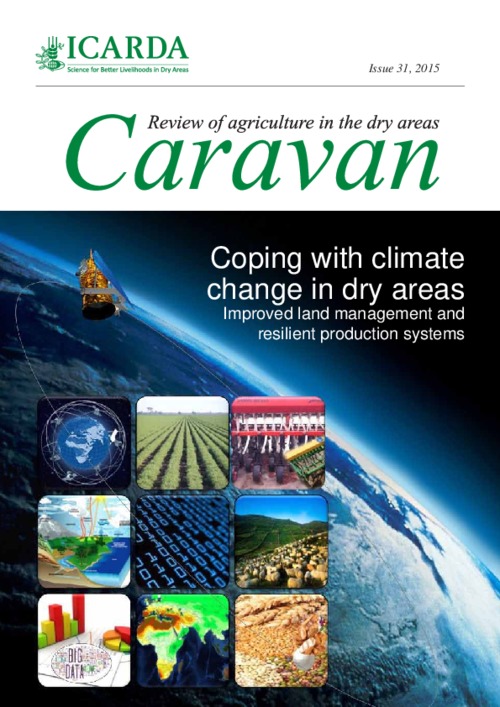Managing hunting under uncertainty: from one-off ecological indicators to resilience approaches in assessing the sustainability of bushmeat hunting
Taking the Bitter with the Sweet: Sugarcane's Return as a Driver of Tropical Deforestation
Drivers of Forests and Tree-based Systems for Food Security and Nutrition
Women’s Experiences On Food Security In Kenya: Major Challenges That They Face
This paper discusses the major challenges women in Kenya face as they try to ensure and maintain food security at the household level. The challenges include access to and ownership of resources such as land, finance, water and affordable cooking energy; access to markets and proper infrastructure and
Caravan 31: Coping with climate change in dry areas
This issue of Caravan showcases some of ICARDA’s efforts of coping with climate change in dry areas with improved water land management and resilient production systems. These include initiatives in conservation agriculture which provide sustained production levels while conserving the ecosystems on which our entire food system is dependent upon. ICARDA continues to make significant contributions in the promotion of sustainable water land management approaches and technologies devised by researchers and farmers.
The Land Question in the Food Sovereignty Project
This essay explores the changing landscape of food sovereignty politics in the shadow of the so-called ‘land grab’. While the food sovereignty movement emerged within a global agrarian crisis conjuncture triggered by northern dumping of foodstuffs, institutionalized in WTO trade rules, the twenty-first-century food, energy and financial crises intensify this crisis for the world’s rural poor (inflating prices of staple foods and agri-inputs) deepening the process of dispossession.
REDD+ at the crossroads: Choices and tradeoffs for 2015 – 2020 in Laos
To date, REDD+ projects in Laos have made relatively conservative choices on driver engagement, focusing on smallholder-related drivers like shifting cultivation and small-scale agricultural expansion, to the exclusion of drivers like agro-industrial concessions, mining concessions and energy and transportation infrastructure. While these choices have been based on calculated decisions made in the context of project areas, they have created a pair of challenges that REDD+ practitioners must currently confront. The first is lost opportunity.
Workshop on Large-Scale Land Acquisition (LSLA) and Accountability in Africa, Dakar, November 24-26 2015 : summary report of panel discussions
Large-scale land acquisitions (LSLAs) have been a major concern for several developing countries, especially those in sub-Saharan Africa. To make land investment processes more accountable and equitable, as well as to prevent land-based social conflicts, the IDRC has supported projects in 10 countries to study conditions conducive to accountability and towards better access to justice in land investment processes. Differences between land grabbing and LSLA were clarified.
Wettelijke normen ten aanzien van bodem en gewas in relatie tot de KringloopWijze
Om landbouwkundige en milieukundige prestaties van bedrijven te beoordelen, kan het nuttig zijn om prestaties te spiegelen aan normen. Eén van de normen die hiervoor gebruikt kan worden, zijn de normen (opbrengsten, afvoeren, bodemoverschotten, benuttingen) die behoren bij een bedrijf dat de wettelijke toegestane (kunst)mestgiften (‘gebruiksnormen’) maximaal opvult. Dit type normen kan modelmatig geschat worden. Een voorbeeld van een daarvoor geschikt model is het WOD-model.
Role of innovation in meeting food security challenges
Global food production must ramp up in the face of enormous challenges. We are all familiar with many of the key metrics surrounding the central food security challenge: By the year 2050, the earth’s population is expected to soar from the current 7bn about 9.6bn. It is estimated that in the next 40 to 50 years, we will need to produce as much food as was necessary in the previous 10,000.






